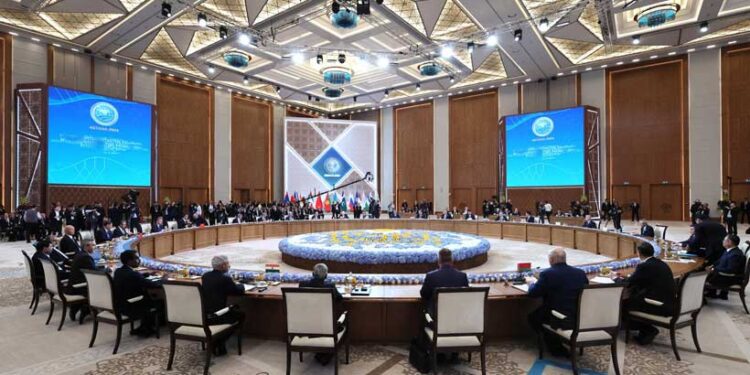As Shehbaz set the stage for the 23rd Shanghai Cooperation Organisation (SCO) summit in Islamabad, the capital city buzzed with anticipation. The two-day event, scheduled for October 16-17, 2024, brings together leaders from eight member states, observers, and special guests to discuss crucial matters of trade, economic cooperation, and regional connectivity within the Eurasian political and security bloc.
Summit Agenda and Participation
The SCO summit, chaired by Pakistani Prime Minister Shehbaz Sharif, aims to approve the organization’s budget and address key issues related to economic collaboration among member states. The meeting has attracted high-level participation from various countries:
- Eight member states are represented by their heads of government.
- Iran’s Minister for Trade, Industry, and Mines, Seyyed Mohammad Atabak, is attending in place of the First Vice President Mohammad Reza Aref, who had to remain in Tehran due to evolving regional situations.
- India’s External Affairs Minister, Dr. Subrahmanyam Jaishankar, represents his country at the summit.
- Mongolia participates as an observer state.
- Turkmenistan has been invited as a special guest.
- Representatives from international organizations such as the Conference on Interaction and Confidence Building Measures in Asia, the Commonwealth of Independent States, and the European Economic Community are also present.
The summit’s agenda includes discussions on climate change and economic challenges faced by member states. Foreign Office spokesperson Mumtaz Zahra Baloch emphasized that hosting the Council of Heads of Government (CHG) reflects Pakistan’s commitment to the SCO charter and the values of the Shanghai Spirit.
PM Shehbaz set to hold Bilateral Meetings
The SCO summit has provided a platform for important diplomatic engagements:
- Prime Minister Shehbaz Sharif set to welcome dinner for the dignitaries, where he briefly interacted with India’s Minister for External Affairs, Dr. Jaishankar.
- Bilateral meetings were held between PM Shehbaz and leaders from Tajikistan, Kazakhstan, Turkmenistan, and Belarus.
- The Indian minister’s visit, being the first senior ministerial-level visit from India in nearly a decade, has attracted significant media attention.
- Both Indian and Pakistani foreign offices have ruled out bilateral talks between the two countries during the summit.
These interactions underscore the summit’s importance in fostering regional dialogue and cooperation, even amidst existing tensions between some member states.
Economic Cooperation and Future Prospects
The SCO summit serves as a crucial platform for enhancing economic ties among member states:
- Discussions focus on increasing trade volumes and facilitating smoother economic interactions within the bloc.
- Regional connectivity initiatives are being explored to boost commerce and people-to-people exchanges.
- The approval of the organization’s budget will provide financial backing for various collaborative projects.
- Climate change and its economic impacts are being addressed, highlighting the bloc’s commitment to sustainable development.
The summit also offers an opportunity for member states to align their economic policies and explore new areas of cooperation, potentially leading to increased investment and joint ventures in the near future.
As the SCO continues to evolve, the Islamabad summit marks a significant step in strengthening the organization’s role in Eurasian affairs. The participation of diverse nations and the focus on economic cooperation demonstrate the bloc’s potential to influence regional dynamics positively.
Prime Minister Shehbaz Sharif’s role as the chair of the Council of Heads of Government underscores Pakistan’s growing importance within the SCO framework. His leadership during the summit is expected to contribute to the advancement of the organization’s objectives and foster a spirit of collaboration among member states.
The presence of high-ranking officials from various countries, including the notable attendance of India’s External Affairs Minister, highlights the summit’s significance in regional diplomacy. While bilateral issues between some member states remain unresolved, the SCO provides a neutral platform for dialogue and cooperation on matters of mutual interest.
As the summit progresses, key outcomes are anticipated in areas such as trade facilitation, energy cooperation, and cultural exchanges. The signing of agreements and joint declarations at the conclusion of the event will likely pave the way for enhanced collaboration in the coming years.
The SCO, with its diverse membership spanning from Eastern Europe to South Asia, represents a unique bloc that bridges different cultural and political systems. This summit in Islamabad serves as a testament to the organization’s ability to bring together nations with varying interests and foster a sense of shared purpose.
As Shehbaz set to conclude the SCO summit, the event’s success will be measured by its ability to translate discussions into concrete actions. The gathering of influential leaders in Islamabad not only elevates Pakistan’s diplomatic profile but also reinforces the SCO’s role as a significant player in shaping Eurasian geopolitics and economic cooperation. The outcomes of this summit are poised to have lasting impacts on regional dynamics and collaborative efforts among member states in the years to come.
Related News
1. SCO Summit 2024 in Pakistan: October Dates, Schedule, Members and Agenda
















